Key takeaways:
- Hard water stains are caused by the accumulation of minerals like calcium, magnesium, and sometimes iron, particularly after water evaporates.
- Effective removal techniques include using vinegar and water solutions, baking soda paste, and commercial stain removers for tough stains.
- Preventing future stains can be achieved through daily maintenance, using a water softener, and choosing pH-balanced cleaning products.
- Regularly applying protective sealants and establishing a cleaning schedule can enhance the maintenance of clean surfaces.
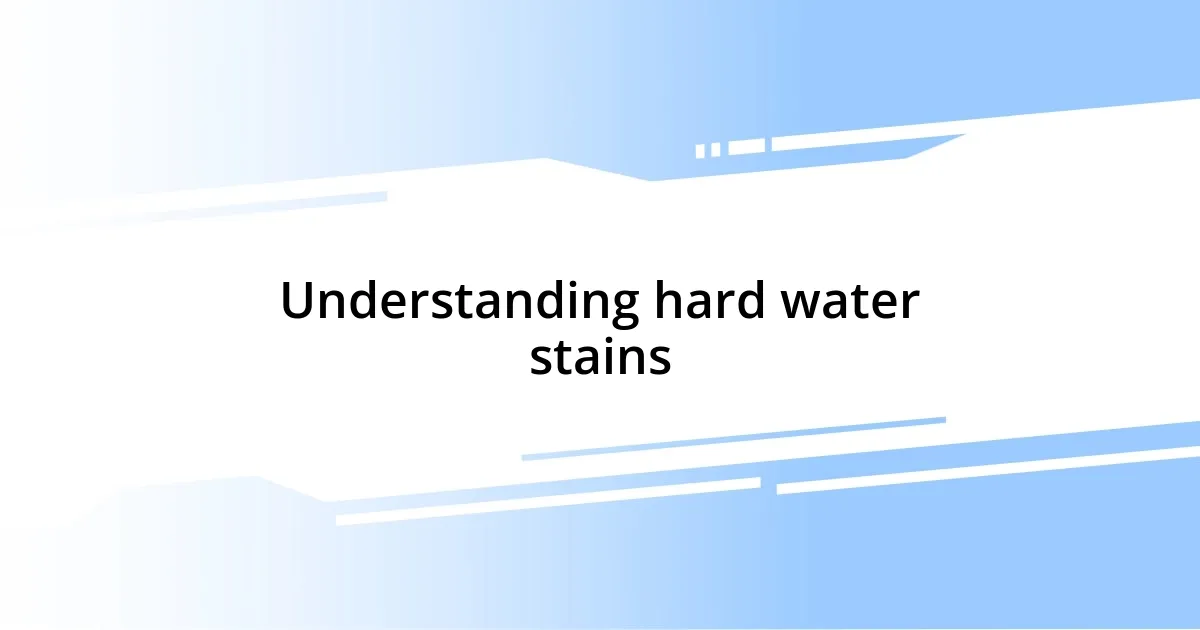
Understanding hard water stains
Hard water stains are those frustrating white or cloudy spots that seem to appear out of nowhere, marring the beauty of your fixtures and glass surfaces. I still remember the first time I encountered these stubborn stains in my new apartment—it felt like I was fighting a losing battle every time I wiped down the bathroom sink. Have you ever wondered why they form in the first place?
The culprit is usually minerals like calcium and magnesium, which accumulate when hard water evaporates. It’s fascinating to think that what we often consider simply an inconvenience is actually a result of the water coming from our own taps! In my experience, the real challenge lies in understanding that these minerals can cling tenaciously, making cleaning feel futile at times.
I’ve noticed that different surfaces seem to react differently to hard water, too. For example, glass shower doors often require more elbow grease than chrome fixtures. Have you ever tried cleaning a heavily stained shower? It can feel like a workout! So, as you begin to tackle your hard water issues, remember that a bit of knowledge can go a long way in figuring out which method will work best for you.
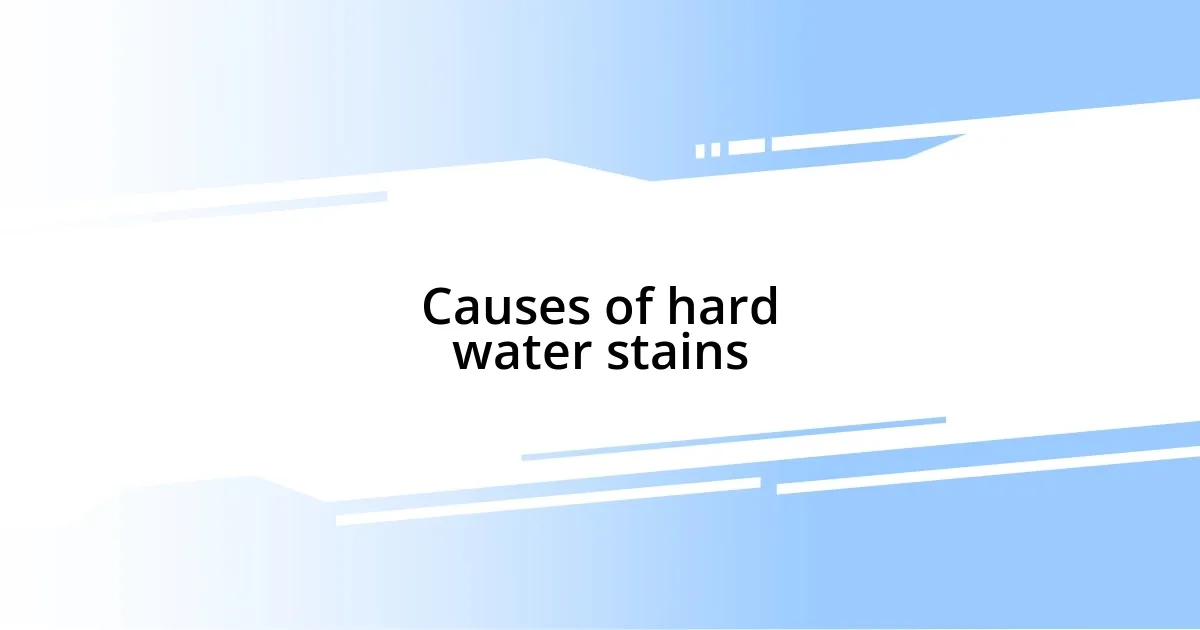
Causes of hard water stains
The formation of hard water stains boils down to the specific minerals in your water supply. I still remember the surprise on my face when I discovered that what seemed like just water could wreak that much havoc on my fixtures. The interplay of heat, evaporation, and mineral content is what leads to those irritating deposits; when water dries up, it leaves behind traces of calcium and magnesium.
- Calcium: Found in many water sources, it precipitates out as deposits when heated.
- Magnesium: Works similarly as calcium but can also contribute to the stubbornness of stains.
- Iron: Sometimes found in hard water can add a rusty hue to stains, especially noticeable on white surfaces.
- pH levels: High pH can cause these minerals to precipitate more quickly, enhancing stain severity.
In my early days of homeownership, I didn’t realize that every time I turned on the tap, those minerals were including their own little welcome mat to my bathroom surfaces. It’s truly mind-boggling to think that the very substance we rely on daily can quietly settle down and leave such a mess.
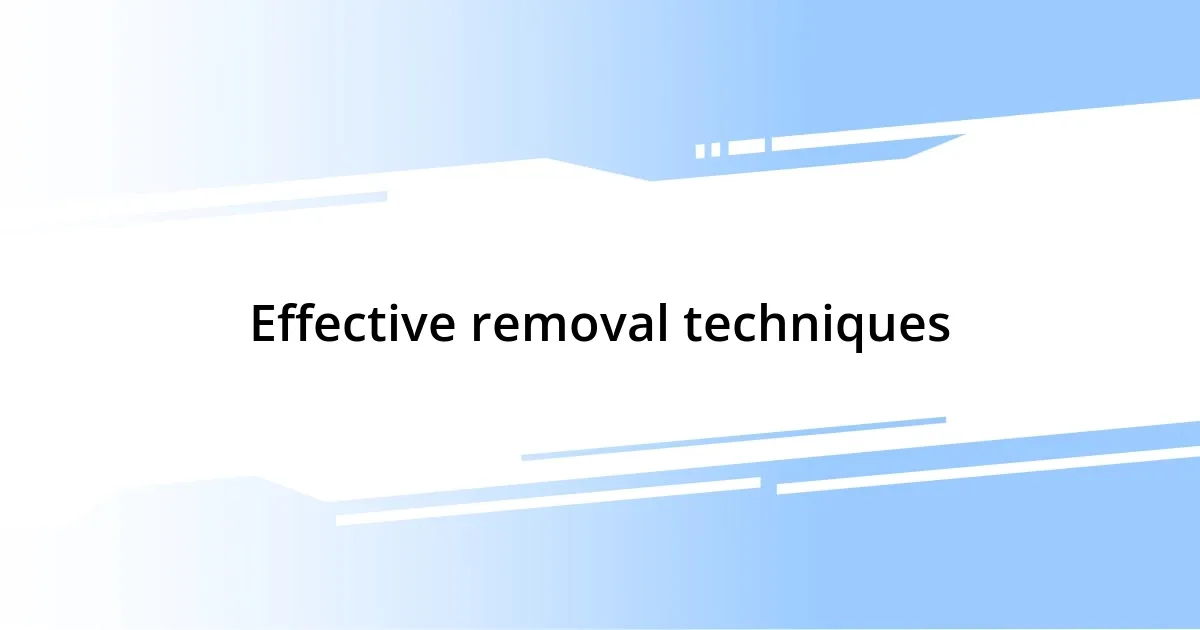
Effective removal techniques
Removing hard water stains can initially feel like an overwhelming task, but I’ve found effective techniques that can simplify the process significantly. One of my go-to methods is using a vinegar and water solution. I remember the first time I tried it—I was genuinely surprised by how well it worked! By spraying the solution on the stained areas, letting it sit for a few minutes, and then wiping it down, I could see the minerals dissolving right before my eyes. If you haven’t tried this method yet, I highly recommend it.
Another technique I’ve resorted to is baking soda paste. Mixing baking soda with a little water creates a thick paste that I apply directly onto stains. I’ll never forget the satisfaction I felt when, after letting it sit for a bit and scrubbing gently, the stains vanished, revealing the original shine of my faucets. It’s a natural cleanser that’s enjoyable to use, and it feels good knowing you’re using something safe and effective.
Lastly, for more persistent stains, commercially available hard water stain removers can do the trick. Just last week, I faced an exceptionally stubborn stain on my glass shower door and decided to give one a try. I was pleasantly surprised to see the dramatic difference after a single application. While I prefer natural methods for most stains, having a reliable product on hand can be a lifesaver.
| Technique | Details |
|---|---|
| Vinegar and Water Solution | Mix equal parts vinegar and water, spray on stains, let sit, then wipe clean. |
| Baking Soda Paste | Combine baking soda with water to create a paste, apply, let sit, and scrub gently. |
| Commercial Stain Removers | Use chemical stain removers for tough, persistent stains, following the manufacturer’s instructions. |
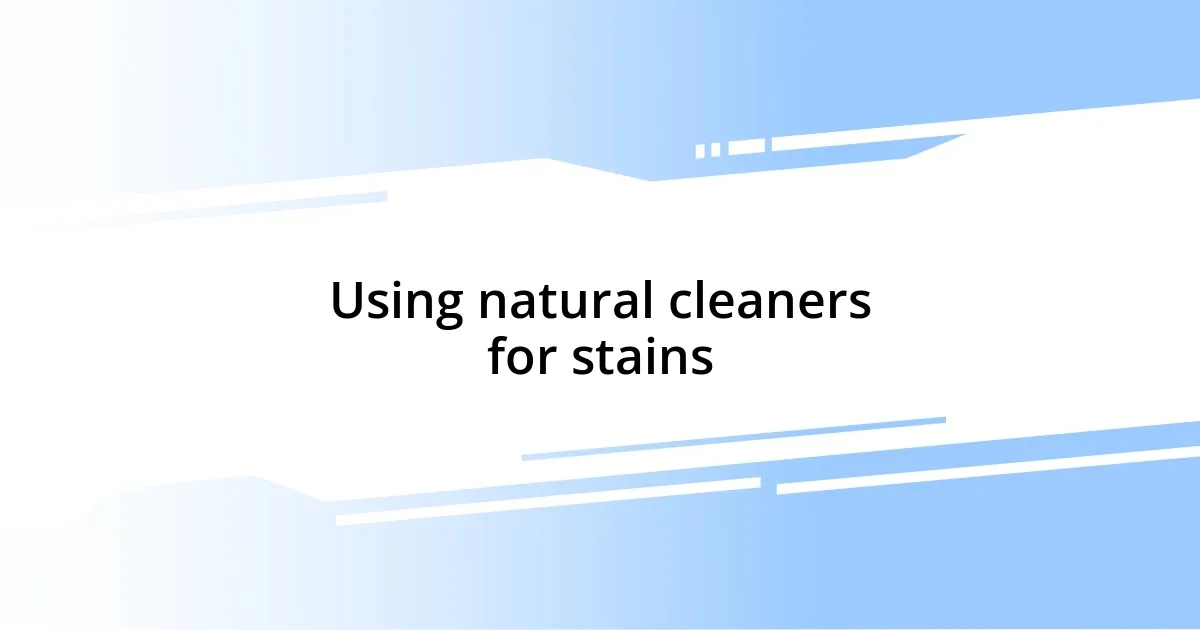
Using natural cleaners for stains
Using natural cleaners for hard water stains can be a game-changer, and I’ve had quite a few enlightening moments with them. For instance, when I stumbled upon the idea of using lemon juice, I thought, “Could something so simple really work?” After squeezing fresh lemon juice onto those pesky stains, I let it sit for a while. As I wiped it away, I was delighted to find that the citric acid had effectively broken down the mineral deposits. It’s amazing how nature has provided us with such powerful cleaning agents.
Similarly, I often find myself reaching for essential oils, especially tea tree oil, which not only smells refreshing but also has antibacterial properties. One day, I decided to mix a few drops with my vinegar solution. The result was not only a clean surface but also a lovely aroma lingering in my bathroom. It got me thinking—who wouldn’t want to cleanse their space while elevating the ambiance? This method has become one of my favorites, proving that cleaning doesn’t have to be a chore.
I’ve also experimented with salt combined with vinegar, which can create a more abrasive yet natural scrub. I remember a particularly stubborn mineral buildup on my sink that just wouldn’t budge. I mixed coarse salt with vinegar and turned scrubbing into something oddly satisfying. Each scrub felt like I was battling a little foe, and to see the stains lift away was incredibly gratifying. Using these natural cleaners not only leaves my surfaces gleaming but gives me a sense of accomplishment—like I’m in control of my home environment. What do you think? Wouldn’t it feel great to tackle tough stains naturally?
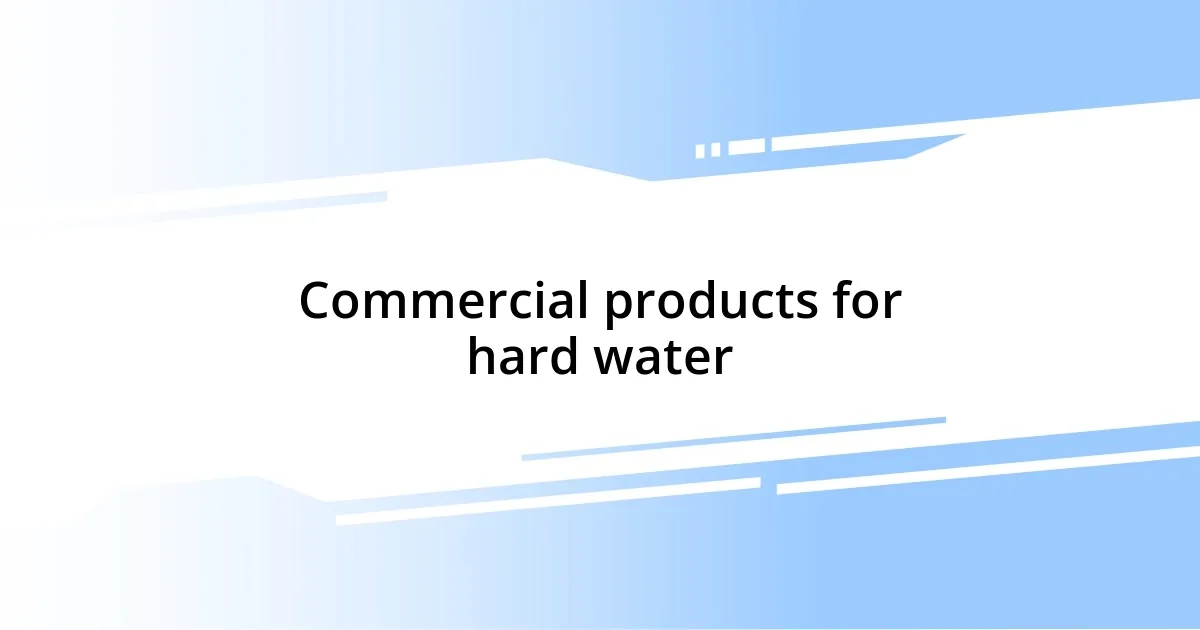
Commercial products for hard water
When it comes to commercial products for hard water stains, I’ve tried a few brands that really stand out. Just the other day, I used a well-known spray cleaner that claims to eliminate hard water stains with minimal effort. I remember spraying it onto my shower tiles and feeling a rush of anticipation. Sure enough, after a quick wipe, I was amazed at how effortlessly the grime disappeared. It’s incredible how these products can save time and often yield instant results.
Another product that has made a notable difference in my cleaning routine is a concentrated hard water stain remover. I remember reading the label, which promised professional-grade results, and I was skeptical at first. However, once I followed the directions and applied it to some tough spots in my kitchen, I found myself genuinely impressed. It was as if the stains had never existed! I can’t help but wonder how I cleaned before without this little powerhouse in my arsenal.
While I appreciate the efficiency of commercial products, I always keep safety in mind. Some of these cleaners have strong chemical compositions, and I once learned that the hard way when I accidentally mixed different products, creating a noxious fume. Yikes! Since then, I always read labels thoroughly and follow precautions to avoid mishaps. Have you experienced similar moments? It’s a reminder that, while commercial cleaners are handy, being cautious is just as important.
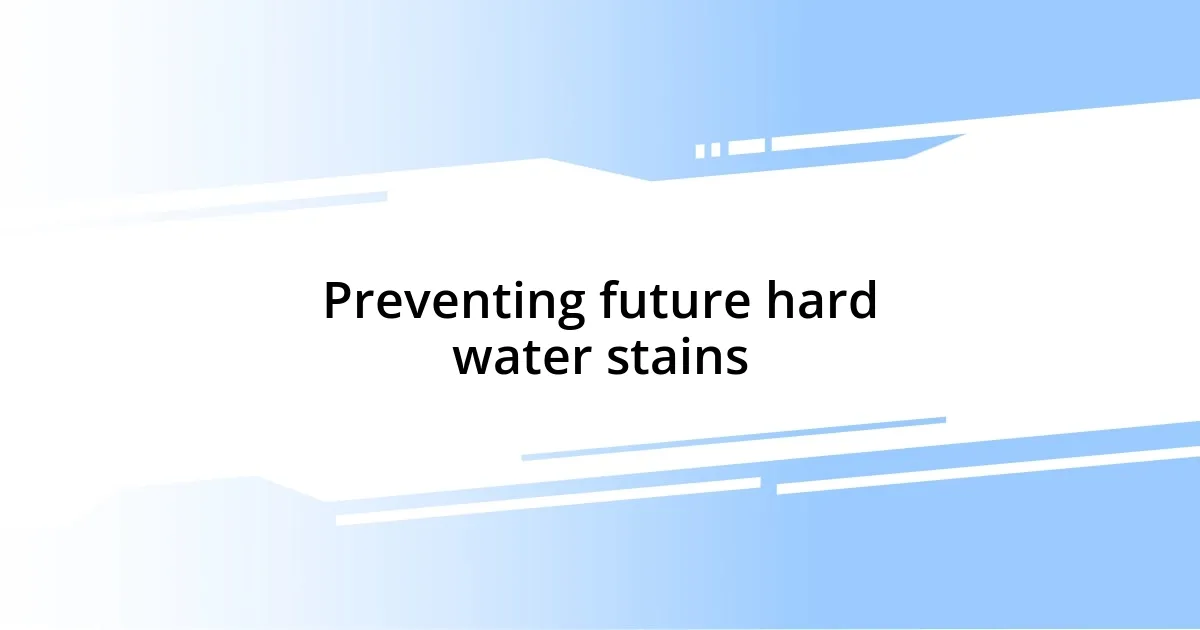
Preventing future hard water stains
To prevent future hard water stains, I’ve found that a quick daily wipe-down can be incredibly effective. After a shower, I take a few moments to use a squeegee on the tiles and glass. I remember the first time I tried this—at first, I thought it was a cumbersome task, but now, I see it as something essential and almost meditative. It only takes a minute, but it truly makes a difference for keeping surfaces clear.
Another method that has worked wonders for me is using a water softener. I didn’t think much about this until a friend recommended it after I complained about my stubborn stains. So, I did some research and installed one in my home. The transformation was astonishing! The spots I once dreaded became a worry of the past. If you’ve ever struggled with those fingerprints of hard water, you can imagine how relieved I felt. Isn’t it rewarding to invest in something that pays off by reducing cleaning time significantly?
Lastly, I’ve learned to be strategic about my cleaning products. For instance, I always opt for pH-balanced ones that specifically target hard water deposits. I recall the first time I used one—I could feel the weight lifted from my shoulders as I saw my surfaces gleaming like new. There’s something empowering in that choice, right? It simplifies the cleaning process and gives me peace of mind, knowing I’m actively preventing future stains from forming. Have you considered what impact your cleaning products have on hard water stains?
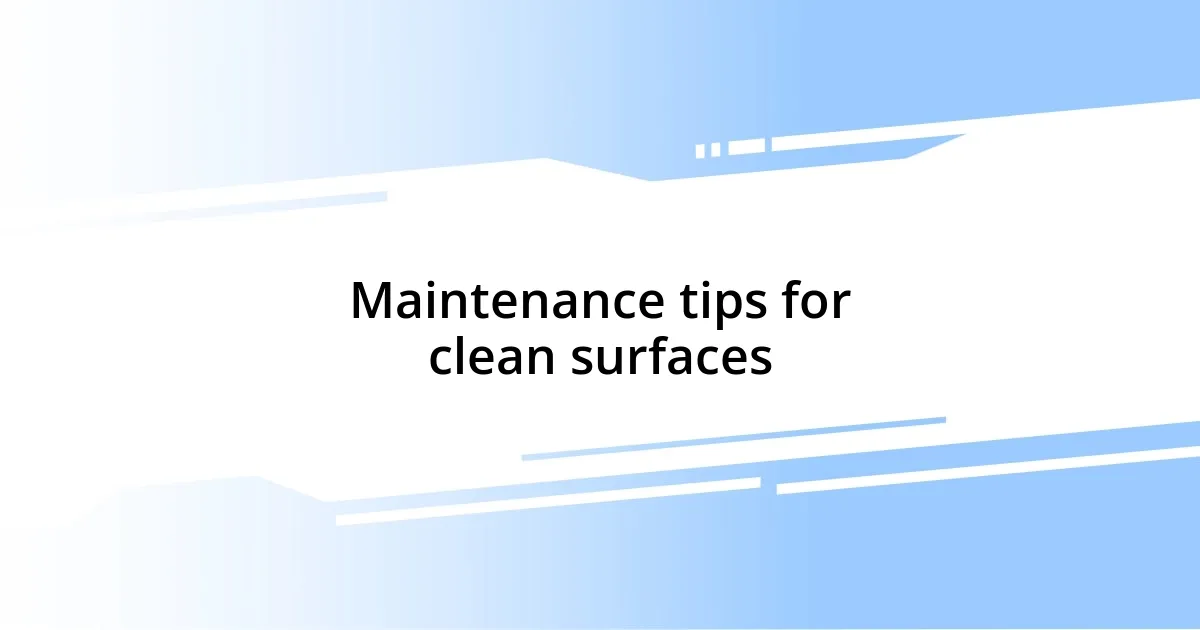
Maintenance tips for clean surfaces
Maintaining clean surfaces requires a bit of routine, but I’ve discovered that it can actually be quite rewarding. For example, I make it a habit to regularly apply a protective sealant to my shower tiles. The first time I did this, I was pleasantly surprised by how much easier it became to wipe away soap scum. It felt like I had given my tiles a shield against grime! Have you tried using a sealant? It’s worth considering if you want to maintain that pristine look effortlessly.
I also believe in the power of natural cleaning solutions. I’ve recently switched to a vinegar and baking soda mix for daily cleaning. When I first used it, I was skeptical, thinking it could never replace my go-to commercial cleaner. But to my delight, after just a few minutes of scrubbing and rinsing, the surfaces sparkled! Sometimes, simple solutions can deliver fantastic results. What have you found to be your secret weapon in fighting hard water stains?
In addition, I noticed that setting a specific cleaning schedule really helps keep things on track. Personally, I’ve chosen Sundays for a deeper clean, making it almost like a ritual. I remember one particular Sunday where I blasted my favorite music while scrubbing away the week’s buildup—what a mood booster! Pairing cleaning with something enjoyable can make all the difference. Have you thought about when you do your cleaning? Finding that sweet spot in your routine can lead to much cleaner surfaces with less hassle.














